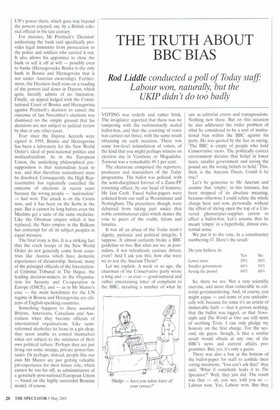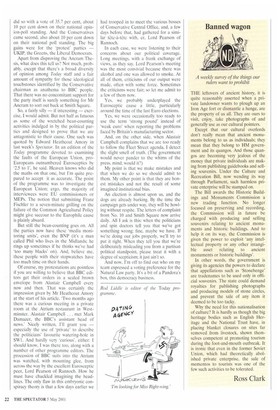THE TRUTH ABOUT BBC BIAS
Rod Liddle conducted a poll of Today staff: Labour won, naturally, but the UKIP didn't do too badly
VOTING was orderly and rather brisk. The invigilator reported that there was no tampering with the rudimentarily sealed ballot-box, and that the counting of votes was carried out thrice, with the same result obtaining on each occasion. There was some low-level intimidation of voters, of the kind that you might perhaps witness on election day in Vientiane or Mogadishu. Turnout was a remarkable 89.1 per cent.
The electorate comprised the reporters, producers and researchers of the Today programme. The ballot was policed, with the semi-disciplined fervour of a Zanu-PF returning officer, by our head of features, Mr lain Croft. Faxed ballot-papers were solicited from our staff at Westminster and Nottingham. The presenters, though, were debarred from taking part under that noble constitutional edict which denies the vote to peers of the realm, felons and lunatics.
It was all an abuse of the Today team's dignity, patience and political integrity, I suppose. It almost certainly broke a BBC guideline or two. But what are we, as journalists, if not relentlessly curious; driven, even? And I ask you this: how else were we to test the Ancram Thesis?
Let me explain. A week or so ago, the chairman of the Conservative party wrote a long and — as ever — good-natured and rather entertaining letter of complaint to the BBC, detailing a number of what he
saw as editorial errors and transgressions. Nothing new there. But on this occasion he also addressed the wider problem of what he considered to be a sort of institutional bias within the BBC against his party. He was quoted by the Sun as saying, The BBC is empty of people who hold Conservative views. The politically correct environment dictates that belief in lower taxes, smaller government and saving the pound are the wrong beliefs to hold.' This, then, is the Ancram Thesis. Could it be true?
Let's be generous to Mr Ancram and assume that 'empty', in this instance, has been stripped of its absolute meaning, because otherwise I could refute the whole charge here and now, personally, without the effort of slicing open the top of a Universal photocopier-supplies carton to effect a ballot-box. Let's assume that he meant 'empty' in a hyperbolic, almost existential sense.
We put it to the vote, in a constituency numbering 47. Here's the result: Do you believe in: Lower taxes Yes 50% No 50% Smaller government 66% 34% Saving the pound 60% 40%
So, there we are. Not a very scientific exercise, and more than vulnerable to editorial gerrymandering. And, of course, you might argue — and some of you undoubtedly will, because for some it's an article of immovable faith — that it proves nothing; that the ballot was rigged, or that Newsnight and The World at One are still nests of seething Trots. I can only pledge my honesty on the first charge. For the second, my guess, though, is that a similar result would obtain at any one of the BBC's news and current affairs programmes. But, yes, it's only a guess.
There was also a box at the bottom of the ballot-paper for staff to confide their voting intentions. 'You can't ask that!' they said. 'What if somebody leaks it to The Spectator?' Well, they just did. The result was that — ah, you see, told you so — Labour won. Yes, Labour won. But they did so with a vote of 35.7 per cent, about 10 per cent down on their national opinion-poll standing. And the Conservatives came second, also about 10 per cent down on their national poll standing. The big gains were for the 'protest' parties — UKIP, the Greens. the Liberal Democrats.
Apart from disproving the Ancram Thesis, what does this tell us? Not much, probably, except that there's a broad diversity of opinion among Today staff and a fair amount of sympathy for those ideological touchstones identified by the Conservative chairman as anathema to BBC people. That there was no concomitant support for the party itself is surely something for Mr Ancram to sort out back at Smith Square.
So, a fairly silly — if interesting — exercise, I would admit. But not half as fatuous as some of the wretched bean-counting activities indulged in by the political parties and designed to prove that we are antagonistic to their cause. One such was quoted by Edward Heathcoat Amory in last week's Spectator. In an edition of the Today programme devoted to examining the faults of the European Union, proEuropeans outnumbered Eurosceptics by 2.5 to l', he said. Heaven knows who did the maths on that one, but I'm quite prepared to accept it as accurate. The point of the programme was to investigate the European Union; ergo, the majority of interviewees were EU commissioners or MFPs. The notion that submitting Franz Fischler to a seven-minute grilling on the failure of the Common Agricultural Policy might give succour to the Europhile cause is plainly absurd.
But still the bean-counting goes on. All the parties now have these 'media monitoring units', even the BNP (it's a man called Phil who lives in the Midlands; he rings up sometimes if he thinks we've had 'too many blacks' on). And, believe me, these people with their stopwatches have too much time on their hands.
Of course, my protestations are pointless if you are willing to believe that BBC editors get their orders in a sealed brown envelope from Alastair Campbell every now and then. That was certainly the impression given by Mr Heathcoat Amory at the start of his article. 'Two months ago there was a curious meeting in a private room at the Atrium restaurant in Westminster. Alastair Campbell . . . met Mark Damazer, the BBC's assistant head of
news.' Nicely written, grant you — especially the use of 'private' to describe the politicians' favourite watering-hole in SW1. And hardly very 'curious', either: I should know, I was there too, along with a number of other programme editors. The procession of BBC suits into the Atrium was watched, with mounting glee, from across the way by the excellent Eurosceptic peer, Lord Pearson of Rannoch. How he must have chuckled imagining the headlines. The only flaw in this embryonic conspiracy theory is that a few days earlier we
had trooped in to meet the various bosses of Conservative Central Office, and, a few days before that, had gathered for a similar tete-a-tete with, er, Lord Pearson of Rannoch.
In each case, we were listening to their concerns about our political coverage. Long meetings, with a frank exchange of views, as they say. Lord Pearson's meeting was the most convivial because there was alcohol and one was allowed to smoke. At all of them, criticisms of our output were made, often with some force. Sometimes the criticisms were fair; so let me admit to a few of them now.
Yes, we probably underplayed the Eurosceptic cause a little, particularly around the time of the last Euro elections.
Yes, we were occasionally too ready to use the term 'strong pound' instead of 'weak euro' when reporting the problems faced by Britain's manufacturing sector.
And, on the other side, when Alastair Campbell complains that we are too ready to follow the Fleet Street agenda, I detect the slight smell of truth. (The government would never pander to the whims of the press, mind, would it?) My point is that we make mistakes and that when we do so we should admit to them. My other point is that they are honest mistakes and not the result of some imagined institutional bias.
An election is almost upon us, and the dogs are already barking. By the time the campaign gets under way, they will be howling without respite. The letters of complaint from No. 10 and Smith Square now arrive daily. All I ask is this: when the politicians and spin doctors tell you that we've got something wrong; fine, maybe we have. If we're doing our jobs properly, we'll try to put it right. When they tell you that we're deliberately misleading you from a partisan political standpoint, please treat it with a degree of scepticism; it just ain't so.
And now, I'm off to find out who on my team expressed a voting preference for the Natural Law party. It's a bit of a Pandora's box, this democracy business.
Rod Liddle is editor of the Today programme.











































































 Previous page
Previous page